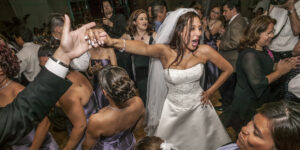Photographers have long had an uneasy relationship with the sacred. There is the age-old anxiety that a photograph can steal a soul. And last week, more than 900 wedding photographers signed a petition complaining that “problematic vicars” can be “rude, humiliating, aggressive and abusive”. The fact is, the sacred has a deep and visceral distrust of the whole business of taking photos, which — in our Instagram-addled age — has resulted in a colossal culture clash.
One photographer, Rachel Roberts, who launched the petition, took a pop at problematic vicars. “They basically forget the fact that two people are getting married, and it’s the most important day of their lives. They put their own objectives and their own rules first and forget the reason why we’re all actually here.” Talk about getting things the wrong way round. The reason we are all there is for two people to enter into holy matrimony, not for wandering photographers to get the best angle for the album.
The problem is that photographs don’t just record reality — they change it. Quantum physicists talk of the observer effect: the very act of observing reality causes a disturbance within it, and thus changes it. Something similar is true of wedding photography. We pose for photographs. We behave differently when we are being captured on film. We may feel awkward or self-conscious; we may pout or posture. In extreme cases, reality is bent around the presence of the photographic: lighting is enhanced, people are asked to stand in different places and look in different ways. Reality becomes a stage set.
And while photographers might like to describe themselves as a near-invisible presence, they are not. They set up stands, fiddle with their technology, wander around, distract the congregation and interject themselves into the scene that they are supposed to be silently capturing. No wonder vicars and photographers have an awkward relationship, especially at weddings.
Their feud is heightened by the fact that too many photographers don’t know the difference between a church and a secular hall. They don’t appreciate that a sacred space is often structured around graduations of holiness; that certain bits of the church are dedicated to specific liturgical functions. Taking cameras into the sanctuary, for instance, disturbs the sense that the couple is entering into something holy. The Hebrew word for holy is kodesh, which means to be set apart, and it is this setting apart that lies at the heart of a service of holy matrimony. In the sacred sanctuary, with the priest, the couple make their vows to almighty God — but someone ambling in with a camera undermines this moment completely. And photographers will do this even if you have specifically asked them not to. They wager that if the service is in progress, the vicar will not have the front to call them out on it. I tell couples at the rehearsal that I will do precisely that if their photographer doesn’t behave. And I have done.
Photographers buzzing about like entitled brats, thinking the service is all about them make weddings less special. But it’s more than just behaviour. Susan Sontag wrote in her brilliant exploration of the philosophy of photography: “To photograph people is to violate them, by seeing them as they never see themselves… it turns people into objects that can be symbolically processed.” This is soul-stealing redescribed for the acquisitive society. The Marxist critic György Lukács called it “reification” — that is, turning something living into an object. In other words, the transformation of living, breathing human love into a visual commodity, something frozen and dead.
Sontag also wrote that “photographs are a way of imprisoning reality”. This has never been truer. A wedding video is so powerful and vivid that, over time, it drives out one’s own natural memories. Many couples tell me that, after a while, all they can remember of their wedding is the video that was filmed of it. For some, this is an argument for spending more on the photographer — after all, the wedding video carries the burden of being your memory of that special day. But I suspect that it actually supplants genuine memories, replacing the point of view of the couple getting married with that of a stranger. Over half a century later, my parents can still remember lots of little, idiosyncratic things about their wedding: a smile, a mood, a hat. It’s very personal and specific, it comes and goes, memories return to elicit a smile of recollection. But these days our memories are curated and colonised by technology. We let someone else choose what it is that we remember. Video photography becomes a form of mental pollution.
Part of this epic clash of cultures is that photographers work for the happy couple, whereas the vicar doesn’t. The vicar is not just one more employee among others. The local parish church is a space where the wider Church offers a service for those who want it. Marriage is a gift from God, not a commercial relationship. There are some things that can’t be negotiated — even with those who use manipulative references to “my special day” as a way of turning the church into a stage set. Fundamentally, this is not a relationship of customer and service provider. If you want that, go to the town hall — where your photographer can do whatever they please.
So when the photographer turns up 10 minutes before the service and tells me how it’s going to be, that this is how the bride wants it, it makes little difference. They will stay behind the pillar and take photographs from the back, and not follow the bride down the aisle as if this were some catwalk show. They hate it, of course. But you don’t just walk into the house of God and expect the place to bend to your needs. The fact that this space is different, reflects different values, is precisely why people choose to be married here.
Disclaimer
Some of the posts we share are controversial and we do not necessarily agree with them in the whole extend. Sometimes we agree with the content or part of it but we do not agree with the narration or language. Nevertheless we find them somehow interesting, valuable and/or informative or we share them, because we strongly believe in freedom of speech, free press and journalism. We strongly encourage you to have a critical approach to all the content, do your own research and analysis to build your own opinion.
We would be glad to have your feedback.
Source: UnHerd Read the original article here: https://unherd.com/



